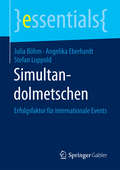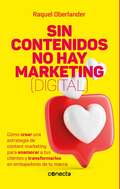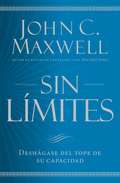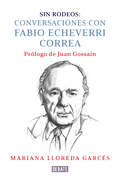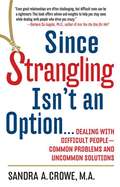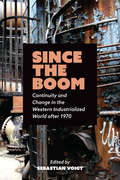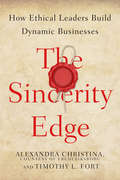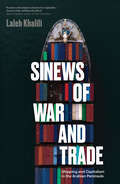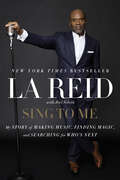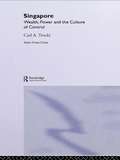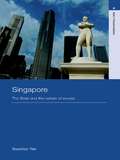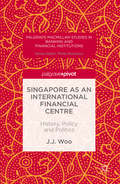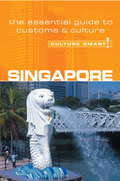- Table View
- List View
Simultandolmetschen: Erfolgsfaktor für internationale Events (essentials)
by Stefan Luppold Julia Böhm Angelika EberhardtJulia B#65533;hm, Angelika Eberhardt sowie Stefan Luppold zeigen in diesem essential, dass Simultandolmetschen ein wesentlicher Mehrwert und Erfolgsfaktor f#65533;r internationale Events ist, der Verstehen, Verst#65533;ndnis und Verst#65533;ndigung gleicherma#65533;en charakterisiert. Sie geben Event-Veranstaltern und Professional Congress Organizers (PCOs) das R#65533;stzeug f#65533;r die Einbindung von Simultandolmetschern in die Etappen der Event-Planung an die Hand. Daneben besprechen die Autoren neue technische Entwicklungen und ihren zuk#65533;nftigen Einsatz.
SIN Capital and the Fullerton Health IPO
by Josh Lerner Ann LeamonIn early 2016, David Sin, founder of the Singapore-based private equity group SIN Capital and chairman of its primary holding, Fullerton Health, was deeply involved in preparations for taking Fullerton public on the Singapore stock exchange. Three years after SIN Capital had invested in Fullerton, a provider of enterprise health management, and two years ahead of the original plan, it had attained a valuation of over S$1 billion. Listing the company would provide a number of important benefits as the management team and the investors expanded the operation throughout South Asia. This case describes the benefits and drawbacks of Fullerton's planned IPO, along with the strategy that had propelled its impressive growth. It also presents David Sin's vision for SIN Capital as a different type of private equity firm.
Sin contenidos no hay marketing (digital)
by Raquel OberlanderCómo crear una estrategia de content marketing para enamorar a tus clientes y transformarlos en embajadores de tu marca. El mundo cambió. Los seres humanos cambiamos. El marketing también debe hacerlo. Y para eso solo hay un camino: los contenidos, que permiten entregar valor real a las personas. Hacer marketing de contenidos es mucho más que levantarse un día y subir un post a Instagram o un video a TikTok. Es definir una estrategia, trazar un plan y ejecutarlo. Un proceso que implica muchísimas etapas, tareas, canales, tácticas, roles y saberes, que Raquel Oberlander tuvo la capacidad de condensar en un modelo al que bautizó HEPIC 10 y que comparte con infinita generosidad en este libro. Crear contenidos obliga a las organizaciones a definir un propósito que va mucho más allá de las ventas y la rentabilidad. Obliga a mirar el alma, en lugar de mirarse el ombligo. Y luego entregar aquello que se descubre en forma de mensajes que no interrumpan lo que las personas están viendo, sino que sean lo que quieren ver (o leer o escuchar). Sin contenidos no hay marketing (digital) está dedicado a profesionales de marketing y comunicación, pero también a los CEO, gerentes, emprendedores, músicos, abogados, contadores, coaches, porque, de una manera u otra, todos necesitamos generar contenido para promover el crecimiento de nuestros proyectos y de nuestra marca personal. Y también es ideal para los creadores de contenido, ya sean productores audiovisuales, diseñadores gráficos, redactores, influencers, freelancers, community managers, que son los aliados clave y grandes protagonistas en este proceso.
Sin filtro: La historia secreta de Instagram
by Sarah FrierInstagram ha cambiado la tecnología y los negocios, la cultura y la comunicación y también nos ha cambiado a todos nosotros. ¡Descubre sus secretos! Instagram está tan ligado a nuestro día a día que su historia no puede disociarse del impacto que tiene sobre nuestras vidas. Desde su creación en el año 2010 de la mano de Kevin Systrom y Mike Krieger como una aplicación simple e intuitiva, lnstagram se ha convertido en una máquina de hacer famosos como nunca antes se había visto -ya sea en el patio de los colegios, en el mundo cultural o en el de la moda- en busca de un reconocimiento digital que obtiene gracias a likes, comentarios, seguidores y espectaculares acuerdos con distintas empresas. Más de doscientos millones de usuarios de Instagram cuentan con más de cincuenta mil seguidores, el nivel necesario para vivir de publicar promocionando marcas. Y millones de personas y de marcas tienen más seguidores en Instagram que suscriptores tiene el The New York Times hasta tal punto que, anunciarse a través de estas personas que crean tendencias, cuentan historias o tienen seguidores, se ha convertido en un negocio multimillonario. Sin filtro es el primer libro que desvela los secretos de Instagram a través del testimonio de quienes lo hicieron realidad. ¿Cómo crearon ese espacio donde compartimos versiones aspiracionales de nuestra vida, transformando nuestro sentido colectivo de la realidad? ¿Qué caminos se abren para asegurar su incesante crecimiento tras la adquisición por Facebook? Además, a partir de distintos casos reveladores, el libro nos ofrece el análisis de las estrategias de éxito que los usuarios del software culturalmente más importante de nuestra generación han desarrollado para crear su imagen y potenciar su fama: desde los adolescentes hasta las figuras más icónicas de nuestros tiempos o las startups más innovadoras y las mayores compañías del mundo. Reseñas:«Sin filtro es un libro de empresa apasionante, repleto de historias de creatividad, ambición e intriga, y a la vez un retrato antropológico de la vida moderna. Con un pulso trepidante, Sarah Frier relata con todo detalle cómo Instagram se ha convertido en un fenómeno cultural y reflexiona sobre qué dice el éxito de esta aplicación acerca de todos nosotros.»Ashlee Vance, autor de Elon Musk «Esta fascinante historia del imparable ascenso y de la inevitable transformación de una de las redes sociales más populares e influyentes nos invita a reflexionar sobre qué, o quién, es el verdadero producto en las nuevas tecnologías.»Kirkus Reviews
Sin límites: Libere el m¿ximo de su capacidad
by John C. Maxwell#1 New York Times bestselling author John C. Maxwell's latest book will enhance the lives of leaders, professionals, and anyone who wants to achieve success and personal growth. We often treat the word capacity as if it were a natural law of limitation. Unfortunately, most of us are much more comfortable defining what we perceive as off limits rather than what's really possible. Could it be that many of us have failed to expand our potential because we have allowed what we perceive as capacity to define us? What if our limits are not really our limits? In his newest book, John Maxwell identifies 17 core capacities. Some of these are abilities we all already possess, such as energy, creativity and leadership. Others are aspects of our lives controlled by our choices, like our attitudes, character, and intentionality. Maxwell examines each of these capacities, and provides clear and actionable advice on how you can increase your potential in each. He will guide you on how to identify, grow, and apply your critical capacities. Once you've blown the "cap" off your capacities, you'll find yourself more successful--and fulfilled--in your daily life.
Sin rodeos: Conversaciones con Fabio Echeverri Correa
by Mariana Lloreda Garcés"¿Qué pensaría Fabio del momento actual? ¿Qué diría de los acontecimientos más recientes?". Estas son preguntas recurrentes que se hacen algunas personas que conocieron y admiraron a Fabio Echeverri Correa. Porque, más allá de su legado como dirigente gremial en la Andi y de su liderazgo en las campañas y gobiernos de Álvaro Uribe Vélez,Echeverri era bien conocido -incluso entre sus detractores- por su inteligencia privilegiada, por su forma particular de concebir el país y por su capacidad de sintetizar y comentar los sucesos nacionales. Varios años después de su muerte, en una Colombia igual o más convulsionada de la que dejó, resulta oportuno recordar a ese Echeverri, el que le hablaba de frente al país. Este texto, producto de extensas entrevistas realizadas por Mariana Lloreda entre el 2015 y el 2017, trae al presente con fidelidad su voz franca, aguda y vehemente: una voz independiente que opinaba sin rodeos. Con el sosiego y la capacidad de retrospección que confieren los años, Echeverri hace un recuento y un balance de su vida. Es su versión como testigo, pero también como indiscutible protagonista de los hechos que marcaron la historia reciente de Colombia.
Since Strangling Isn't an Option: Common Problems and Uncommon Solutions
by Sandra A. CroweDo certain people have you gritting your teeth, biting your tongue, and (metaphorically, at least) banging your head against the wall? Do you feel like you're expending too much energy either engaging in conflict or desperately trying to avoid it? There really are better, easier ways to deal with difficult people. This refreshing, realistic guide, with revealing selfquizzes and engaging exercises included, will provide you with real solutions to the oftentimes "unreal" problems. YOU'LL LEARN ABOUT ... · why dealing with a difficult person doesn't have to ruin your day · the habits that cause continued conflict-and the techniques that can turn things around · how developing an "attitude of gratitude" helps smooth the way · your own power in shaping relationships (it can make a bigger difference than you think!) · snakes and lizards, donkeys and hyenas: specific advice for specific personality types With mindfulness, compassion, and common sense, it is possible to deal successfully with difficult people. And with enough practice of the principles in this book-and a healthy dose of patience-you might even get to like them. "Dealing with difficult people is an unavoidable fact of life in our fast-moving, competitive society. This book shows you how to defuse the negative aspects of another's behavior and be more effective in every situation." -Brian Tracy, author of Maximum Achievement
Since the Boom: Continuity and Change in the Western Industrialized World after 1970 (German and European Studies)
The 1970s are of particular relevance for understanding the socio-economic changes still shaping Western societies today.The collapse of traditional manufacturing industries like coal and steel, shipbuilding, and printing, as well as the rise of the service sector, contributed to a notable sense of decline and radical transformation. Building on the seminal work of Lutz Raphael and Anselm Doering-Manteuffel, Nach dem Boom, which identified a "social transformation of revolutionary quality" that ushered in "digital financial capitalism," this volume features a series of essays that reconsider the idea of a structural break in the 1970s. Contributors draw on case studies from France, the Netherlands, the UK, the US, and Germany to examine the validity of the "after the boom" hypothesis. Since the Boom attempts to bridge the gap between the English and highly productive German debates on the 1970s.
The Sincerity Edge: How Ethical Leaders Build Dynamic Businesses
by Timothy L. Fort Alexandra Christina, Countess of FrederiksborgRecognizing their role as "corporate citizens," companies are seeking guidance on how to be true to their missions, principled in practice, and well regarded for their contributions to society. As this book reveals, the key lies in sincerity—the sum of values like authenticity, integrity, and trust. Countess Alexandra Christina, a European corporate director, and Timothy L. Fort, a leading American scholar, delineate a clear and actionable model for bringing sincerity to the business context. Their vision for sincerity complies with law, aligns corporate social and financial performance, and values corporate ethics in its own right, rather than as a means to an end. Underpinning this model is a synthesis of the top research in the field and a suite of new interviews with current and former CEOs. Tracing inspirational tales and scandals alike, this book shows how leaders can head up companies that more reliably make good decisions and conduct themselves in a trustworthy manner. It then concludes with twelve concrete actions that businesses can take to cultivate "the sincerity edge."
Sinews of War and Trade: Shipping and Capitalism in the Arabian Peninsula
by Laleh KhaliliA wide-ranging account of shipping and capitalism in the Middle EastOn the map of global trade, China is now the factory of the world. A parade of ships full of raw commodities -iron ore, coal, oil- arrive in its ports, and fleets of container ships leave with manufactured goods in all directions. The oil that fuels China's manufacturing comes primarily from the Arabian Peninsula. Much of the material shipped from China are transported through the ports of Arabian Peninsula, Dubai's Jabal Ali port foremost among them. China's 'maritime silk road' flanks the Peninsula on all sides. Sinews of War and Trade is the story of what the making of new ports and shipping infrastructures has meant not only for the Arabian Peninsula itself, but for the region and the world beyond. The book is the account of how maritime transportation is not simply an enabling adjunct of trade, but central to the very fabric of global capitalism. The ports that serve maritime trade, logistics, and hydrocarbon transport create racialised hierarchies of labour, engineer the lived environment, aid the accumulation of capital regionally and globally, and carry forward colonial regimes of profit, law and administration.
Sing to Me: My Story of Making Music, Finding Magic, and Searching for Who's Next
by LA Reid Joel SelvinIn this long-awaited memoir, illustrated with over 100 never-before-seen photos from his personal collection, the groundbreaking record producer chronicles his struggles, his success, and the celebrated artists that made him a legend.Over the last twenty-five years, legendary music producer and record man LA Reid—the man behind artists such as Toni Braxton, Kanye West, Rihanna, TLC, Outkast, Mariah Carey, Pink, Justin Bieber, and Usher—has changed the music business forever. In addition to discovering some of the biggest pop stars on the planet, he has shaped some of the most memorable and unforgettable hits of the last two generations, creating an impressive legacy of talent discovery and hit records.Now, for the first time, he tells his story, taking fans on an intimate tour of his life, as he chronicles the fascinating journey from his small-town R&B roots in Cincinnati, Ohio, and his work as a drummer to his fame as a Grammy Award-winning music producer and his gig as a judge on the hit reality show, The X Factor. In Sing to Me, Reid goes behind the scenes of the music industry, charting his rise to fame and sharing stories of the countless artists he’s met, nurtured, and molded into stars. With fascinating insight into the early days of artists as diverse as TLC, Usher, Pink, Kanye West, and Justin Bieber, his story offers a detailed look at what life was like for stars at the start of their meteoric rise and how he always seemed to know who would be the next big thing.What emerges is a captivating portrait from the inside of popular music evolution over the last three decades. Part music memoir, part business story of climbing to the top, this beautifully designed book, jam packed with photos, showcases Reid's trademark passion and ingenuity and introduces a multifaceted genius who continues to shape pop culture today.
Singapore: Smart City, Smart State
by Kent E. CalderHow Singapore's solutions to common problems can provide examples for other societies.Nearly everyone knows that Singapore has one of the most efficient governments and competitive, advanced economies in the world. But can this unique city-state of some 5.5 million residents also serve as a model for other advanced economies as well as for the emerging world? Respected East Asia expert Kent Calder provides clear answers to this intriguing question in his new, groundbreaking book that looks at how Singapore's government has harnessed information technology, data, and a focus on innovative, adaptive governance to become a model smart city, smart state.Calder describes Singapore as a laboratory for solutions to problems experienced by urban societies around the world. In particular, he shows how Singapore has dealt successfully with education, energy, environmental, housing, and transportation challenges; many of its solutions can be adapted in a wide range of other societies.Calder also explains how Singapore offers lessons for how countries can adapt their economies to the contemporary demands of global commerce. Singapore consistently ranks at the top in world surveys measuring competitiveness, ease of doing business, protection of intellectual property, and absence of corruption.The book offers concrete insights and a lucid appreciation of how Singapore's answers to near-universal problems can have a much broader relevance, even in very different societies.
Singapore
by Edward Prewitt Forest ReinhardtSince winning independence in 1965, Singapore achieved some of the world's highest rates of economic growth. A large part of GDP and employment came from direct investment by multinational companies in low-cost assembly work, but in the 1990s Singapore's rising wage rates increasingly priced it out of these industries. Could Singapore change itself from an assembler and fabricator of Western-designed parts to a designer and marketer of desirable products? Lee Kuan Yew, "the father of Singapore," repeatedly had shown an ability to guide the nation through such transitions. Not only did his successor have no such track record, but the next transition might be the hardest yet.
Singapore: Wealth, Power and the Culture of Control (Asia's Transformations/Asia's Great Cities)
by Carl A. TrockiThis volume examines Singapore’s culture of control, exploring the city-state’s colonial heritage as well as the forces that have helped to mould its current social landscape. Taking a comparative approach, Trocki demonstrates the links between Singapore’s colonial past and independent present, focusing on the development of indigenous social and political movements. In particular, the book examines the efforts of Lee Yew Kuan, leader of the People’s Action Party from 1959 until 1990, to produce major economic and social transformation. Trocki discusses how Singapore became a workers paradise, but what the city gained in material advancement it paid for in intellectual and cultural sterility. Based on the latest research, Singapore addresses the question of control in one of the most prosperous and dynamic economies in the world, providing a compelling history of post-colonial Singapore.
Singapore: The State and the Culture of Excess (Asia's Transformations)
by Souchou YaoTaking ideas and frameworks from philosophy, psychology, political science, cultural studies and anthropology, this book tells the larger ‘truth’ about the Singapore state. This book argues that this strong hegemonic state achieves effective rule not just from repressive policies but also through a combination of efficient government, good standard of living, tough official measures and popular compliance. Souchou Yao looks at the reasons behind the hegemonic ruling, examining key events such as the caning of American teenager Michael Fay, the judicial ruling on fellatio and unnatural sex, and Singapore’s ‘war on terror’ to show the ways in which the State manages these events to ensure the continuance of its power and ideological ethos. Lively, and well-written, this book discusses key subject areas such as: leftist radicalism and communist insurgency nation-building as trauma Western ‘yellow culture’ and Asian Values judicial caning and the meaning of pain the law and oral sex food and the art of lying cinema as catharsis Singapore after September 11.
Singapore Airlines: Customer Service Innovation
by Hal Hogan Rohit DeshpandeThe members of Singapore Airlines' (SIA) management committee needs to decide whether to cancel the implementation of the new lie-flat seats in business class after the effects of the global recession on the travel industry in September 2001. SIA was considered the gold standard for its innovative customer service, and the $100 million new seats project for the international market was planned to bolster that reputation. But with increased competition in the airline industry and the dramatic drop in travel after the September 11 terrorist attacks in the United States, the main agenda item for the management committee was how to cut costs.
Singapore Airlines: Premium Goes Multi-Brand
by Dawn Lau Rohit DeshpandeThe members of Singapore Airlines' (SIA) management committee needs to decide whether to cancel the implementation of the new lie-flat seats in business class after the effects of the global recession on the travel industry in September 2001. SIA was considered the gold standard for its innovative customer service, and the $100 million new seats project for the international market was planned to bolster that reputation. But with increased competition in the airline industry and the dramatic drop in travel after the September 11 terrorist attacks in the United States, the main agenda item for the management committee was how to cut costs.
Singapore Airlines (A)
by Christopher W.L. Hart Lucy N. LytleNew competition has led to doubts about Singapore Airlines' excellent reputation for in-flight services. The key to maintaining or improving service is the attitude and proficiency of the cabin crews. The company now discovers that there may be problems in this group. This is a rewritten version of earlier cases by D.D. Wyckoff.
Singapore Airlines (B)
by Christopher W.L. Hart Lucy N. LytleSupplement the (A) case. This is a rewritten version of an earlier supplement by D.D. Wyckoff.
Singapore as an International Financial Centre
by J. J. WooThis book providesan analysis of Singapore's development and success as an internationalfinancial centre (IFC). Chapters demonstrate how Singapore plays a criticalrole in both Asian and global financial markets, despite its relatively smallgeographic size. The author focuses specifically on the factors that havecontributed to the city-state's success and discusses the policy lessons thatcan be derived from it. The book describes the historical, spatial, politicaland policy factors that contributed to Singapore's development as a leadingAsian financial centre and global city, and will be of interest to both policyscholars and practitioners.
Singapore - Culture Smart!
by Angela MilliganCulture Smart! provides essential information on attitudes, beliefs and behavior in different countries, ensuring that you arrive at your destination aware of basic manners, common courtesies, and sensitive issues. These concise guides tell you what to expect, how to behave, and how to establish a rapport with your hosts. This inside knowledge will enable you to steer clear of embarrassing gaffes and mistakes, feel confident in unfamiliar situations, and develop trust, friendships, and successful business relationships.Culture Smart! offers illuminating insights into the culture and society of a particular country. It will help you to turn your visit-whether on business or for pleasure-into a memorable and enriching experience. Contents include* customs, values, and traditions* historical, religious, and political background* life at home* leisure, social, and cultural life* eating and drinking* dos, don'ts, and taboos* business practices* communication, spoken and unspoken"Culture Smart has come to the rescue of hapless travellers." Sunday Times Travel"... the perfect introduction to the weird, wonderful and downright odd quirks and customs of various countries." Global Travel"...full of fascinating-as well as common-sense-tips to help you avoid embarrassing faux pas." Observer"...as useful as they are entertaining." Easyjet Magazine"...offer glimpses into the psyche of a faraway world." New York Times
The Singapore Economy: An Econometric Perspective (Routledge Studies in the Growth Economies of Asia #Vol. 70)
by Tilak Abeysinghe Keen Meng ChoySingapore's phenomenal transformation from Third World to First World status has been of great interest to economists around the world yet there has been little quantitative research done on its economy and institutions. This innovative new research monograph fills the lacunae by presenting the Singapore economy through a macroeconometric model and laying the foundations for further research. Using formal econometric analysis and novel modelling techniques, Abeysinghe and Choy offer rare insights into how the Singapore economy works. Each of the major chapters discusses the implications of the empirical findings for current policy and an entire chapter has been devoted to macroeconomic policy simulations. This book is a unique introduction to the Singapore economy and would be of interest to econometric modellers and policy makers in Singapore as well as advanced undergraduates and graduate researchers interested in modelling small open economies.
The Singapore Economy: Dynamism and Inclusion
by Hian Teck HoonEven after achieving the status of a developed economy, many economies face other challenges which may include economic stagnation and income inequality. The book looks at how a mature economy can continue to weather challenges and how the growth of living standards will depend on productivity growth through Singapore’s experience. After Singapore's rapid economic transformation, the nation is at a crossroads. The book explains how productivity growth in turn depends on technological diffusion from abroad as well as indigenous innovation. It also examines how the design of policy to develop indigenous innovation to promote economic dynamism may come with creative destruction and disruptive effects on jobs and wages. The Singapore Economy provides insight into how we can maintain social cohesion and establish a political equilibrium that embraces the new sources of growth through policy formulation for economic inclusion.
Singapore: "Facing Challenges Together"
by Richard H.K. VietorSince its expulsion from Malaysia in 1965, Singapore had transformed itself from a third world island nation into a vibrant city-state with one of the highest levels of GDP per capita in the world. However, sluggish demand among Singapore's major trade partners began testing the nation's export-driven growth model. It was also becoming clear that the Singaporean government could no longer focus single-mindedly on economic growth. Was Singapore facing a mid-life crisis? If so, how could the government revive optimism in the nation's future?
